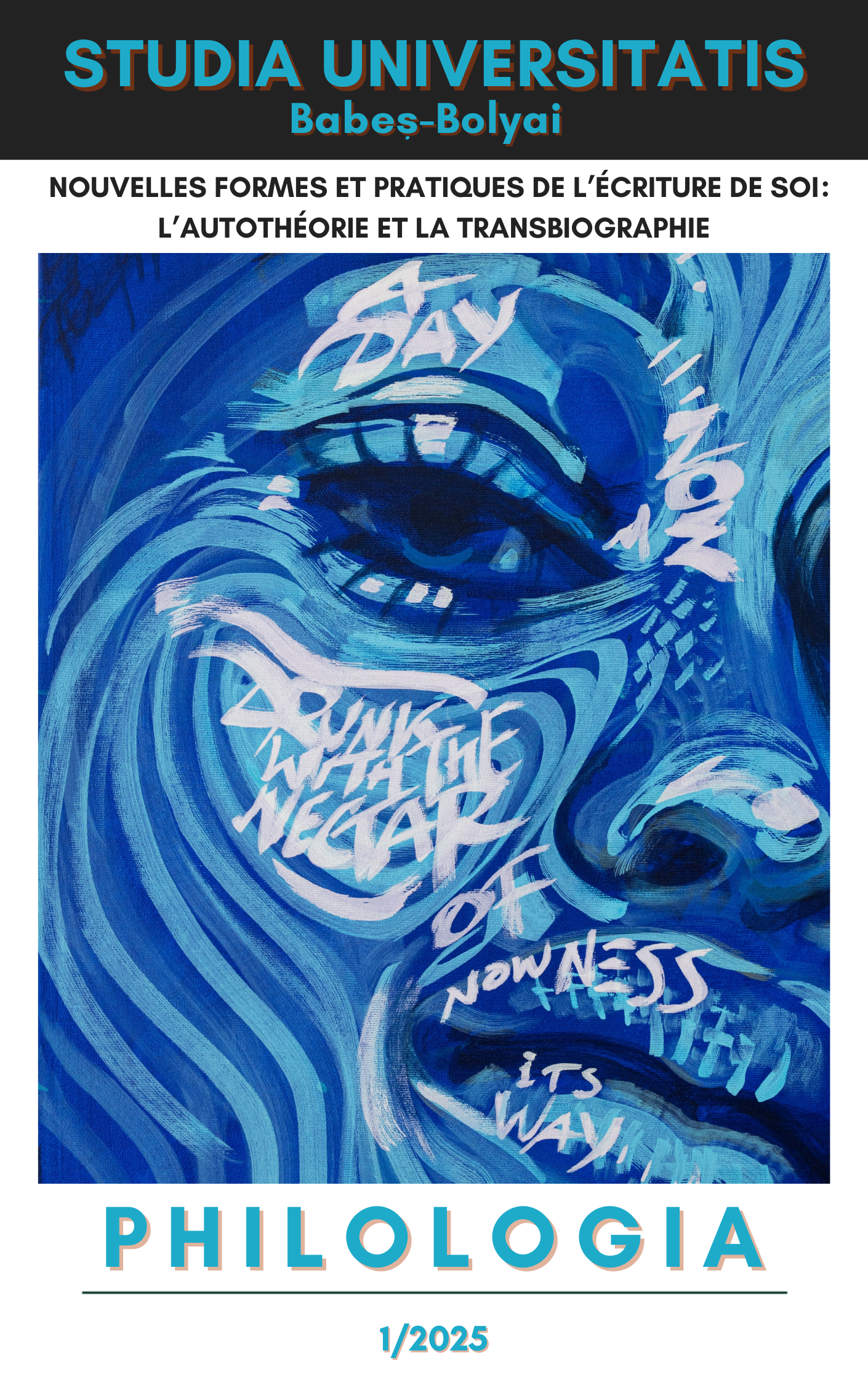L’ESTHÉTIQUE DU QUOTIDIEN : PARADIGME DE L’ÉCRITURE DU SOI DANS PSYCHOPOMPE D’AMÉLIE NOTHOMB
DOI:
https://doi.org/10.24193/subbphilo.2025.1.05Keywords:
autobiography, autotheory, everyday life literature, transbiographyAbstract
The Aesthetics of Everyday Life: A Paradigm of Self-Writing in Psychopompe by Amélie Nothomb. Written in the first person, autobiography, conditioned by the autobiographical pact, does not appear, at a first glance, to be particularly flexible; autofiction, which allows for a certain liberation of the self, is also limited from this point of view, often consisting in a seemingly unfinished experiment, leaving the reader to want more. However, the territory of self-writing now offers fresh interpretive perspectives, thanks to the emergence of notions such as transbiography and autotheory. These allow us to better scrutinize the close links between the intimate and the “extimate”, questioning the interactions between the daily life of the narrative self and the factors that surround it: personal experiences, experiments, and memory locate the self in its contemporaneity through processes of trial and error. Singularity and everyday life break away from the banal and create an aesthetic experience of the uninhibited I, especially when it comes to story and narrative, thus allowing for a literature of the everyday. Through a reading of Amélie Nothomb’s Psychopompe, our aim is to show that the aesthetics of everyday life is a paradigm of feminine self-writing, combining transbiography and autotheory to explore the genesis of the writer and the text.
REZUMAT. Estetica vieții cotidiene: o paradigmă a scriiturii eului în romanul Psychopompe de Amélie Nothomb. Scrisă la persoana întâi, autobiografia, condiționată de pactul autobiografic, nu pare, la prima vedere, un gen foarte flexibil; autoficțiunea, care permite o anumită emancipare a sinelui, este, de asemenea, limitată din acest punct de vedere, constând de cele mai multe ori într-un experiment aparent nefinalizat. Cu toate acestea, teritoriul literaturii personale oferă perspective interpretative noi, datorită apariției unor noțiuni precum transbiografia și autoteoria. Acestea ne permit să analizăm mai bine raportul dintre intim și „extim”, chestionând interacțiunile dintre viața cotidiană, eul narativ și factorii care îl determină; experiențele individuale și memoria plasează, de asemenea, „eul” în propria-i contemporaneitate. Individualitatea și cotidianul se detașează de banal și creează o experiență estetică a unui „eu” naratorial dezinhibat, sursă a unei scriituri a cotidianului. Analiza romanului Psychopompe de Amélie Nothomb, ne va permite să demonstrăm că estetica vieții cotidiene reprezintă o paradigmă a scriiturii personale feminine, care combină transbiografia și autoteoria într-un demers de căutare a „eu”-lui auctorial, dar și a scriiturii înseși.
Cuvinte-cheie: autobiografie, autoteorie, literatura cotidianului, transbiografie
Article history: Received 29 October 2024; Revised 24 February 2025; Accepted 06 March 2025; Available online 25 March 2025; Available print 30 April 2025.
References
Bakhtine, Mikhaïl. 2013. Esthétique et théorie du roman. Trad. par Daria Olivier. Paris : Gallimard.
Balint, Adina et Sara Buekens. 2024. « Expressions du quotidien dans les littératures contemporaines de langue française. » Voix plurielles 21, no. 1 : 2-7.
Bégout, Bruce. 2005. La découverte du quotidien. Éléments pour une phénoménologie du monde de la vie. Paris : Allia.
Certeau (de), Michel. 1990. L’invention du quotidien. Paris : Gallimard, Folio Essais.
Colonna, Vincent. 1989. « L’autofiction, essai sur la fictionalisation de soi en littérature. » Thèse de Doctorat, École des Hautes Études en Sciences Sociales (EHESS).
Doubrovsky, Serge. 2011. Un homme de passage. Paris : Grasset.
Duchamp, Marcel. 1958. Marchand du sel. Paris : Terrain vague.
Fasula, Pierre et Sandra Laugier. 2021. Concepts de l’ordinaire. Paris : Éditions de la Sorbonne.
Fournier, Lauren. 2021. Autotheory as Feminist Practice in Art, Writing, and Criticism. Cambridge (MA) : MIT Press.
Gasparini, Philippe. 2008. Autofiction – une aventure du langage. Paris : Éditions du Seuil.
Gefen, Alexandre. 2021. L’idée de littérature : de l’art pour l’art aux écritures d’intervention. Paris : Éditions Corti.
Heck, Maryline. 2019. Écrire le quotidien aujourd’hui : formes et enjeux. ELFe XX-XXI 8. https://journals.openedition.org/elfe/1193.
Huglo, Marie-Pascale. 2011. « Que se passe-t-il quand il ne se passe rien ? L’événement et le quotidien dans la littérature narrative contemporaine. » Cahier Figura 8, « Poétiques et imaginaires de l’événement » : 81-96.
Lejeune, Philippe. 1975. Le pacte autobiographique. Paris : Éditions du Seuil.
Mistreanu, Diana. 2021. Andreï Makine et la cognition humaine. Pour une transbiographie. Paris : Hermann.
Nothomb, Amélie. 2023. Psychopompe. Paris : Albin Michel.
Propp, Vladimir. 1970. Morphologie du conte. Trad. par Marguerite Derrida, Tzvetan Todorov et Claude Kahn. Paris : Éditions Points.
Downloads
Published
How to Cite
Issue
Section
License
Copyright (c) 2025 Studia Universitatis Babeș-Bolyai Philologia

This work is licensed under a Creative Commons Attribution-NonCommercial-NoDerivatives 4.0 International License.



